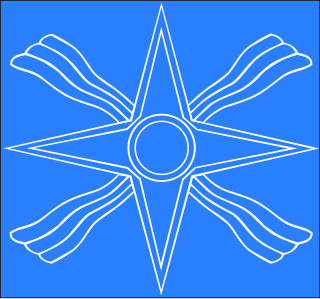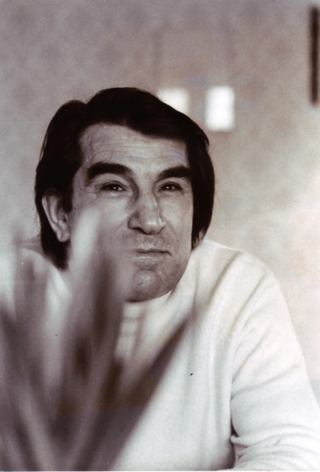
The Patriotic Union of Kurdistan is a political party active in Kurdistan Region and the disputed territories in Iraq. The PUK describes its goals as self-determination, human rights, democracy and peace for the Kurdish people of Kurdistan and Iraq. The PUK is currently under the leadership of Bafel Talabani. The PUK was founded in 1975 by Jalal Talabani, Nawshirwan Mustafa, Fuad Masum, Adel Murad, Ali Askari and Abdul Razaq Feyli Dawood Mohammed Ali. All presidents of Iraq under the 2005 constitution have been from this party.

The Kurdish population of Syria is the country's largest ethnic minority, usually estimated at around 10% of the Syrian population and 5% of the Kurdish population.

Assyrian Democratic Organization (ADO) (Syriac: ܡܛܟܣܬܐ ܐܬܘܪܝܬܐ ܕܝܡܩܪܛܝܬܐ; Arabic: المنظمة الآثورية الديمقراطية), also known as "Mtakasta/Mtakasto", is an Assyrian political party based in Syria. Founded in 1957, it is the oldest Assyrian political party in Syria, and was established as a national, political and democratic movement with the objectives of safeguarding the existence of the Assyrian people, as well as the realization of their legitimate national aspirations (political, cultural, administrative) in their historic homeland.
The Damascus Declaration was a statement of unity by Syrian opposition figures issued in October 2005. It criticized the Syrian government of the Assad dynasty as "authoritarian, totalitarian and cliquish," and called for "peaceful, gradual," reform "founded on accord, and based on dialogue and recognition of the other."

The Kurdistan Democratic Party of Syria, commonly known as KDPS or PDK-S, is a Kurdish Syrian political party founded in 1957 by Kurdish nationalists in northern Syria. The party is based in Hamburg, Germany and has various branches in France, United Kingdom, Sweden and the United States of America.

The Democratic Union Party is a Kurdish left-wing political party established on 20 September 2003 in northern Syria. It is a founding member of the National Coordination Body for Democratic Change. It is the leading political party among Syrian Kurds. The PYD was established as a Syrian branch of the Kurdistan Workers Party (PKK) in 2003, and both organizations are still closely affiliated through the Kurdistan Communities Union (KCK).

The Kurdish National Council is a Syrian Kurdish political party. While the KNC had initially more international support than the ruling Democratic Union Party (PYD) during the early years of the Syrian civil war and a strong supporter basis among some Syrian Kurdish refugees, the overwhelming popular support the PYD enjoys has eroded support for the KNC in Syrian Kurdistan, losing almost all popular support.
The Kurdish Democratic Political Union, or KDPU was a Syrian Kurdish alliance linked to Iraqi Kurdish president Massoud Barzani's Kurdistan Democratic Party (KDP).

The Movement for a Democratic Society is a left-wing umbrella organization in northern Syria founded on 16 January 2011 with the goal of organizing Syrian society under a democratic confederalist system. TEV-DEM is currently chaired by co-chairs Zalal Jagar and Kharib Heso.
The People's Council of West Kurdistan, is one of the main overarching coordinating bodies of Rojava Syria. It is a directly democratic "people's" council founded by various Syrian Kurdish political groups including the Democratic Union Party (PYD), in 2011.

Syrian Kurdistan or Rojava is a region in northern Syria where Kurds form the majority. It is surrounding three noncontiguous enclaves along the Turkish and Iraqi borders: Afrin in the northwest, Kobani in the north, and Jazira in the northeast.

The Rojava conflict, also known as the Rojava Revolution, is a political upheaval and military conflict taking place in northern Syria, known among Kurds as Western Kurdistan or Rojava.

Îlham Ehmed, also rendered as Îlham Ahmed, is a Kurdish politician from Syria and a member of Democratic Union Party currently serving as the co-president of the Executive Council of the Autonomous Administration of North and East Syria (Rojava) and member of the executive committee of the Movement for a Democratic Society (TEV-DEM) coalition. Until July 2018, she was a co-chair of the Syrian Democratic Council (SDC), a political wing of the Syrian Democratic Forces that acts as the legislature for Rojava.

The Kurdish National Alliance in Syria is a Syrian Kurdish coalition formed by five Syrian Kurdish parties in the city of Amuda in the al-Hasakah Governorate of northeastern Syria in 13 February 2016. Four of the five parties in the coalition were originally members of the Kurdish National Council, but were expelled due to their cooperation with the Democratic Union Party (PYD).

The Kurdish Democratic Progressive Party in Syria is one of the oldest Kurdish parties in Syria, having been active since seceding from the Kurdistan Democratic Party of Syria the 1960s. Prominently led by Abd al-Hamid Darwish for much of its history, who was described as "one of the last remaining of the original Kurdish political activists", the PDPKS serves as the Syrian sister party of the Iraqi Patriotic Union of Kurdistan. Known for its moderate and conciliatory politics, the party has sided at different times during the Syrian Civil War with the Syrian opposition, the Ba'athist government, the Kurdish National Council, and the Democratic Union Party.
In the early morning of 25 April 2017, the Turkish Air Force conducted multiple airstrikes against media centers and headquarters of the People's Protection Units (YPG) and the Women's Protection Units (YPJ) in northeastern Syria, and against positions of the Sinjar Resistance Units (YBŞ) on Mount Sinjar, northwestern Iraq. The airstrikes killed 20 YPG and YPJ fighters in Syria in addition to five Peshmerga soldiers in Iraq.

Kurdistan Region–Syria relations are bilateral relations between Kurdistan Region and Syria. Kurdistan Region and Syria are neighbors, but Kurdistan Region only borders PYD-held Rojava since the Syrian civil war. Kurdistan Region and Syria share two border-crossings, and 237,364 Syrian refugees remained in Kurdistan Region in December 2023.

The first Rojava regional elections were held on 1 December 2017. Local councils for the Jazira Region, Euphrates Region and Afrin Region were elected as well as for the subordinate cantons, areas and districts of the regions of Rojava. This followed the communal elections that were held on 22 September and was to be followed by a federal parliamentary election of the Syrian Democratic Council, the region's highest governing body, initially scheduled for January 2018, but was later postponed.
Ibrahim biro, head of the Yekiti Kurdistan Party - Syria, from March 2013 to late December 2018. Born in the city of Amouda July 7, 1965 of the Syrian province of Hasakah. He received his high school diploma from the city's high school and continued his studies at the Intermediate Institute of Railways in Aleppo in 1985. To work as a civil servant at the Syrian Railways Corporation one year after graduating.

Nûredîn Zaza was a Kurdish politician, writer and poet. He was a co-founder of the Kurdistan Democratic Party of Syria and a founding member of the Kurdish Institute of Paris.


















